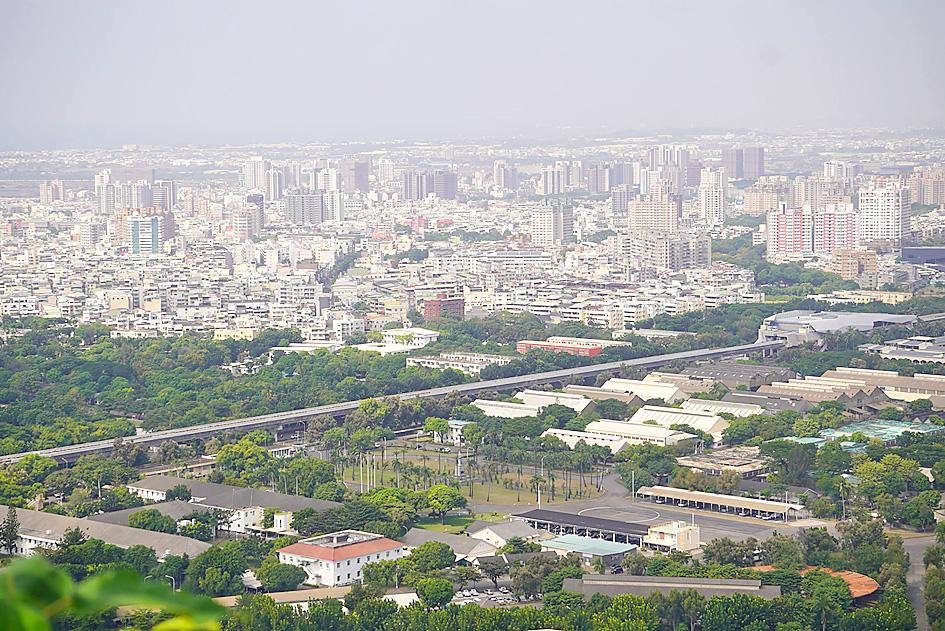Housing transactions in the six special municipalities fell 11.2 percent sequentially last month to 22,439 units, as buyers turned more cautious amid higher interest rates and unfavorable government policies, real-estate brokers said on Monday.
The figure represented a 0.9 percent increase compared with the same period last year, based on data compiled by the six local governments.
Taipei, Taoyuan, Tainan and Kaohsiung all reported double-percentage declines to 2,747, 3,687, 1,933 and 3,389 units respectively last month, when the Tomb Sweeping Day holiday cut working days by three, Sinyi Realty Inc (信義房屋) research manager Tseng Ching-der (曾敬德) said in a press release.

Photo: CNA
An interest rate hike of 0.25 percentage points in March and the Executive Yuan’s approval of a proposal to heavily fine “dishonest marketing practices” affected sentiment, Tseng said.
The central bank on March 17 raised interest rates by 25 basis points and is widely believed to be planning further tightening measures like its peers around the world to combat inflation.
Consumer prices have climbed above the 2 percent alert level for seven straight months and might not come down until the second half of the year, the Directorate-General of Budget, Accounting and Statistics has said.
Property transfers in New Taipei City were relatively resilient, posting a 5 percent decline to 6,113 units, Tseng said, adding that Taichung posted an 8 percent fall to 4,570 units.
Tseng voiced concern that the market would worsen this month, as people avoid going out after daily COVID-19 cases hit more than 20,000 yesterday.
A recovery is unlikely until the infection numbers stabilize, he said.
Health authorities have forecast that millions of Taiwanese would be infected before the outbreak can be brought under control, likely in the middle of next month.
In the first four months of the year, housing transactions in the six special municipalities hit a nine-year high of 87,360 units, up 3.2 percent from a year earlier, data showed.
That was led by increases of 5.3 percent in New Taipei City, 4.9 percent in Taichung, 4.6 percent in Tainan and 2.8 percent in Kaohsiung, the data showed.
Taipei reported a minimal increase of 0.4 percent but Taoyuan saw a 0.3 percent decrease, the data showed.

MULTIFACETED: A task force has analyzed possible scenarios and created responses to assist domestic industries in dealing with US tariffs, the economics minister said The Executive Yuan is tomorrow to announce countermeasures to US President Donald Trump’s planned reciprocal tariffs, although the details of the plan would not be made public until Monday next week, Minister of Economic Affairs J.W. Kuo (郭智輝) said yesterday. The Cabinet established an economic and trade task force in November last year to deal with US trade and tariff related issues, Kuo told reporters outside the legislature in Taipei. The task force has been analyzing and evaluating all kinds of scenarios to identify suitable responses and determine how best to assist domestic industries in managing the effects of Trump’s tariffs, he

TIGHT-LIPPED: UMC said it had no merger plans at the moment, after Nikkei Asia reported that the firm and GlobalFoundries were considering restarting merger talks United Microelectronics Corp (UMC, 聯電), the world’s No. 4 contract chipmaker, yesterday launched a new US$5 billion 12-inch chip factory in Singapore as part of its latest effort to diversify its manufacturing footprint amid growing geopolitical risks. The new factory, adjacent to UMC’s existing Singapore fab in the Pasir Res Wafer Fab Park, is scheduled to enter volume production next year, utilizing mature 22-nanometer and 28-nanometer process technologies, UMC said in a statement. The company plans to invest US$5 billion during the first phase of the new fab, which would have an installed capacity of 30,000 12-inch wafers per month, it said. The

Taiwan’s official purchasing managers’ index (PMI) last month rose 0.2 percentage points to 54.2, in a second consecutive month of expansion, thanks to front-loading demand intended to avoid potential US tariff hikes, the Chung-Hua Institution for Economic Research (CIER, 中華經濟研究院) said yesterday. While short-term demand appeared robust, uncertainties rose due to US President Donald Trump’s unpredictable trade policy, CIER president Lien Hsien-ming (連賢明) told a news conference in Taipei. Taiwan’s economy this year would be characterized by high-level fluctuations and the volatility would be wilder than most expect, Lien said Demand for electronics, particularly semiconductors, continues to benefit from US technology giants’ effort

‘SWASTICAR’: Tesla CEO Elon Musk’s close association with Donald Trump has prompted opponents to brand him a ‘Nazi’ and resulted in a dramatic drop in sales Demonstrators descended on Tesla Inc dealerships across the US, and in Europe and Canada on Saturday to protest company chief Elon Musk, who has amassed extraordinary power as a top adviser to US President Donald Trump. Waving signs with messages such as “Musk is stealing our money” and “Reclaim our country,” the protests largely took place peacefully following fiery episodes of vandalism on Tesla vehicles, dealerships and other facilities in recent weeks that US officials have denounced as terrorism. Hundreds rallied on Saturday outside the Tesla dealership in Manhattan. Some blasted Musk, the world’s richest man, while others demanded the shuttering of his